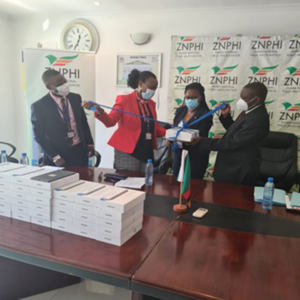As the world continues to respond to the COVID-19 crisis, information has never been more important. In fact, access to information and accurate data is critical for decision-making in real-time.
Gathering and accessing this kind of information in Zambia has been complicated, as data on COVID cases and COVID vaccinations are recorded in hard copy form first before being transferred to an electronic format by Zambian Ministry of Health staff. This practice is inefficient in terms of collecting timely data and can result in data entry errors.
To address this challenge, USAID’s Evidence for Health (E4H) project, implemented by MSI, successfully handed over 900 Samsung Galaxy Tab tablets to the Ministry of Health and the Zambia National Public Health Institute (ZNPHI) as part of its support to strengthen COVID-19 surveillance and reporting systems. By distributing these tablets to district health offices and health facilities, it will enable electronic data collection. The project team, in collaboration with the Ministry of Health, is also supporting training for staff on the COVID-19 reporting system that has been created for use on the tablets.
The timeliness of this gift is distinct for these last 18 months have not been easy. In the process, some of my staff have gotten sick. But we took care of them, and they have come back ready to continue in this fight. So, I wanted to express our gratitude. This is a huge amount of support.— Professor Victor Mukonka, Director-General, ZNPHI
 The handover ceremony was held at ZNPHI’s offices. In the photo from left to right: Gift Sitenge, E4H, Senior Advisor, Knowledge Management, Data Demand and Use (KM/DDU); Celia Kakande, E4H, Chief of Party; Professor Victor Mukonka, ZNPHI, Director General; Ms. Mazyanga, ZNPHI, Cluster Head for Communication, Information and Research
The handover ceremony was held at ZNPHI’s offices. In the photo from left to right: Gift Sitenge, E4H, Senior Advisor, Knowledge Management, Data Demand and Use (KM/DDU); Celia Kakande, E4H, Chief of Party; Professor Victor Mukonka, ZNPHI, Director General; Ms. Mazyanga, ZNPHI, Cluster Head for Communication, Information and Research
The Zambia Evidence for Health (E4H) project supports USAID in expanding its internal evidence base through improving and expanding implementing partners’ contributions of data and learning to inform decision making. This project builds upon our successful work on the USAID Ghana Evaluate for Health project. There, we built a thriving M&E community of practice and helped to create sustainable systems to support future M&E, including the successful rollout of an e-Tracker system to collect client transaction data at the community and sub-district levels.